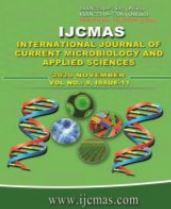


 National Academy of Agricultural Sciences (NAAS)
National Academy of Agricultural Sciences (NAAS)

|
PRINT ISSN : 2319-7692
Online ISSN : 2319-7706 Issues : 12 per year Publisher : Excellent Publishers Email : editorijcmas@gmail.com / submit@ijcmas.com Editor-in-chief: Dr.M.Prakash Index Copernicus ICV 2018: 95.39 NAAS RATING 2020: 5.38 |
Common bean (Phaseolus vulgaris L.) plays an important role in human and animal nutrition. However, its cultivation in Cameroon is affected by diseases, especially the white bean mold caused by Sclerotinia sclerotiorum. Methods of protection against this pathogen are the use of chemical fungicides which are very expensive and degrade the environment. The search for alternative solutions is necessary. The objective of this work is to evaluate the antifungal activity of aqueous and organic extracts of Moringa oleifera seeds on the development of two strains of S. sclerotiorum. The experiment was conducted in the laboratory using the Potato Dextrose Agar culture medium and three doses of extracts from organic solvent (methanol, ethanol and acetone) and water extracts were used. These doses were 12.5 (C1); 25 (C2) and 50 (C3) µl/ml. The results showed that, at the highest concentration of 50 (C3) µl/ml, methanol, aqueous, acetone and ethanol extracts of M. oleifera showed a percentage inhibition of 52.56; 60; 97.18 and 100 % respectively for strain 1, and 45.13; 13.85; 56.02 and 97.44 % respectively for strain 2. No significant difference (P Ë‚ 0.05) was observed between the percentages inhibition of extracts with ethanol and acetone for strain 1 (100 and 97.18% respectively) and that obtained with the synthetic fungicide Plantineb 80WP (100%). Minimal inhibitory concentration which reduced growth up to 50% ranged from 0.87 to 1.70 μl/ml ethanolic extract of M. oleifera for strains 1 and 2 respectively compared to 2 and 11.13 μl/ml aqueous extract respectively. The percentage inhibition of growth of strains in C3 dose showed that aqueous and organic extracts of M. oleifera seeds compared to synthetic fungicide can be an alternative control method of S. sclerotiorum.
 |
 |
 |
 |
 |